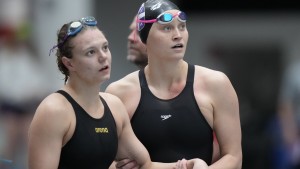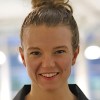Nine points separated Kenyon from a national title in 2019, the narrowest margin between first- and second-place teams in a Division III women's swimming and diving championship. As sophomores, Crile Hart ’22 and Emmie Mirus ’22 made their presence known, winning four combined titles and breaking two Kenyon records.
It would be three years before Kenyon’s swimming and diving teams would return to the national stage. The pandemic upended collegiate athletics, forcing the NCAA to cancel the March 2020 championship just days before it was scheduled to begin, and the 2021 meet that would have marked the end of Hart’s and Mirus’ senior seasons.
Determined to complete their swimming careers on their own terms, Hart and Mirus joined other student-athletes in making the difficult decision to defer their senior years, opting to return this fall to what they hoped would be a more typical Kenyon routine. After months of swim practices, in-person classes and team meals in Peirce, the Kenyon women’s swimming and diving team accomplished what they were motivated to do years earlier — capture the national title for Kenyon, their first since 2009 and 24th in program history.
Congratulations on your national title! Are you still riding the high of that history-making win or are things returning to normal now that you’re back in Gambier?
Crile Hart: For me, life without swimming is never going to be normal. This is the first time in my life that I'm not going to practice every afternoon. But we're still riding the high. It was the most perfect ending to our swimming careers we both ever could have imagined.
Let’s go back to March 12, 2020. That was the day you learned that the 2020 national meet would be canceled, just days before you were scheduled to leave for Greensboro. Do you remember what was going through your minds at that time?
Emmie Mirus: That was one of the worst days of my life. To be honest, it was heart-wrenching. During that spring break, we ate a lot of our meals at Mazza’s in Mount Vernon, and we were watching March Madness games being canceled left and right. For some reason, it never occurred to us that they would cancel the Division III Swimming and Diving Championship. We had such audacity! But after one of those lunches, we went back to practice and found out the meet was canceled. People took it differently, but it just seemed unreal. We were so sad.
Hart: I've talked about this specific day with quite a few people recently. We literally were on the last step of our entire season. We were about to leave. We were about to race. We were all feeling great in the water. And it was taper time, when our practices become easier and shorter, so our bodies feel more rested and ready. We were almost there, and then the rug was pulled out from underneath us. It was hard to accept both our sadness and the fact that this was needed for the entire world.
It must have been difficult to transition from a mindset of being focused on the championship to processing what was going on in the world, and what that meant for your season.
Hart: It was very challenging. What we did as a team was cry together. And then we did a team cheer and screamed, and got our emotions out. It was our way of mourning the loss of the potential we all had. It was a hard day, but I also think it has motivated not only Emmie and me, but many people across all sports, to come back and see results.
Can you talk about another pivotal moment? You both ended up deferring your senior years, waiting a full year to return to Gambier to complete your Kenyon and swimming careers. How hard was it to make that decision?
Mirus: Shortly after learning about the swim meet, we were all sent home through the end of the year. I didn't think about deferring until that summer, but a few other people had started talking about it. I had a call with Jess [Book ’01], and he said, “I'll support your decision either way, but you should know that I really don't think it's going to look or feel normal next year. And I don't think there's going to be a championship meet at the end of the season.” I could not even fathom my time at Kenyon ending that way. I wanted to finish what we'd started. I wanted that closure.
Hart: When nationals were canceled, I remember telling my parents that it felt like there was a hole in my heart. And I wasn't sure how it was going to be filled. It took a few months of being at home and in quarantine for it to heal a little. Then, Kenyon sent an email inviting first-years and sophomores back for the first semester, and juniors and seniors back for the spring semester, and I remember feeling the hole in my heart get bigger. It was going to be my last year at Kenyon, and I could not imagine not being in a pool with my teammates, and not being in a classroom with professors.
When you came back to Gambier, how did you visualize your swimming careers ending? Were you picturing yourselves at nationals or taking things a day at a time?
Mirus: At the start of the year, I tried to focus on being really present at every practice and every class and every lift. But there was still that voice in the back of my mind reminding me that there was something at the end of this journey, too. There's a reason why I took all this time off.
Hart: I also was determined to appreciate every single little thing. During my gap year, I would have paid you for the chance to walk to a 5 a.m. swim practice, or to eat a meal Peirce, or to pull an all-nighter. But at the same time, those of us who had experienced a championship — especially the 2019 nationals when we were nine points away from beating Emory — were hungry for a season that would turn out well. We wanted to be the best that we could be — to do what we tried to do our sophomore year and what we had hoped to do our junior year.
Going into the national meet, how were you mentally approaching the competition?
Mirus: I think part of the reason it was successful for me was that I went into it with almost no expectations. I didn't go into it thinking, “We’re going to get this school record, break these relay records, and win the meet after a super hard-fought journey.” For me, the better approach was, “I'm going to go into this and give it all I have.”
Hart: Emmie and I are roommates, and we had this conversation one night. It was really brief, but we looked at each other and said, “I don't know about you, but I just feel in my body that we are going to have a really good year. We can do something special as a team.” So, I just went in with the mindset of hoping to do well for the team, and to perform with the Kenyon cap on.
On the last day of the meet, the outcome was far from decided, with Kenyon, Emory and Denison separated by just 4.5 points. Emmie, did that pressure help propel you to your 100-yard freestyle win — your first individual event title and your personal best?
Mirus: That final afternoon was the first time I became really nervous. Before I started warming up, Fernando [Rodriguez ’04], our sprint coach, took me aside and I started sobbing. I really wanted our team to win. He said, “Whatever happens is okay. It’s going to be okay if we lose and it’s going to be really okay if we win.” When I went behind the blocks, I told myself that whatever I was able to do would be fine. On my first turn, I thought I was winning. Usually in the best races, you're not thinking at all, but I was going fast and thinking, “Keep going.” I couldn’t believe it when I checked the board and saw the number one next to my name. But it was even cooler to see the leaderboard during the award ceremony, because Kenyon was back on top.
It sounds like you were motivated to compete for your team.
Mirus: Absolutely. It never goes well when I swim for myself. I get way too wrapped up in my head. The fastest we ever swim is in relays because we're not swimming for ourselves in those events. We’re swimming for Kenyon, for our team, and for all the people in the stands cheering for us.
Everything came down to the final 400-yard freestyle relay. Kenyon had to finish in at least sixth place to secure the title, and you both swam the last legs. What was going through both of your minds?
Hart: There wasn't as much pressure because the four of us knew we could bust out a really good freestyle. If we needed to win the meet, we definitely could have stepped up. But because we needed to get sixth, we felt confident. I went third, and when I dove in, all I knew was that we were in eighth. I was like, “There is no way that we are about to lose this meet on the last relay.” It was my last swim, and I was hungry. Just “go, go, go.” When I touched and saw we had moved up to third, and Emmie had dove in, I felt a wash of excitement and joy.
Mirus: When Crile dove in, I had no doubt we could do it. I’ve seen Crile swim for four years. I see how she races and how hard she goes for our team. I see how she makes me better. There was something kind of poetic about Crile and I going last.
Hart: To know that we started and finished this thing together was something most people don't get to experience. Our first nationals meet was even in Indianapolis, so we got to go back to the same pool, five years later.
Mirus: Except older, and faster. And even better friends.


